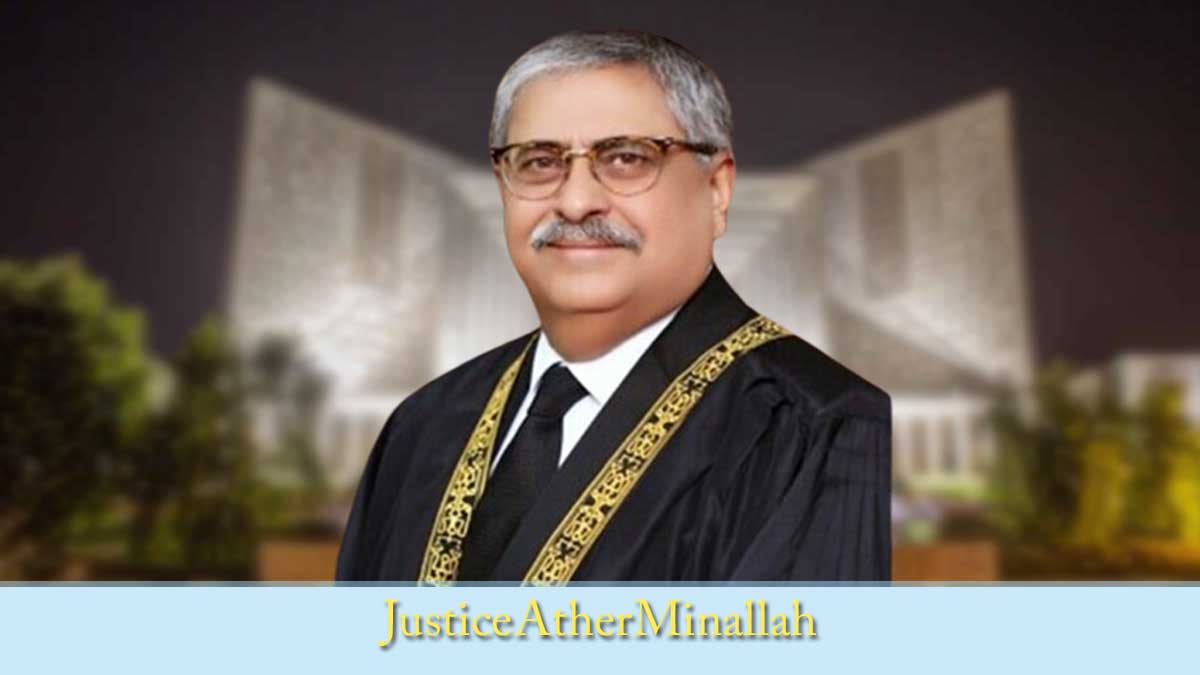
Justice Ather Minallah complains: Supreme Court treats elected officials in a “unflattering” way
More Videos
Published
7 months agoon
By
Jamshed KhanThe only judge who disagreed with the Supreme Court of Pakistan’s decision Justice Ather Minallah (4–1) not to allow livestreaming of the National Accountability Bureau (NAB) law amendments case was Justice Athar Minallah. He stated that the Supreme Court’s handling of elected politicians has been “unflattering.” He said “Imran Khan is not a normal prisoner; he is the leader of the largest political party in Pakistan.”
“There is a good reason to believe that this Court is involved in or agrees with the elected officials who are being shamed, harassed, and persecuted for reasons other than legitimate ones,” Justice Minallah said in his minority decision.
“The results of the last general elections make it clear,” the judge said, that Imran Khan and other past prime ministers have millions of supporters all over the country.
“He is definitely not an ordinary prisoner or convict.”
“Justice Ather Minallah said public has a fundamental right under Article 19-A of the Constitution to have access to information in its original jurisdiction under Article 184(3) of the Constitution,” said the note.
The Justice Ather Minallah judge on the highest court talked about the right given by Article 19-A of the Constitution and said it “is operative and justiciable.”
“Cases heard by this Court on its original jurisdiction under Article 184(3) of the Constitution, including review petitions and other matters arising therein, are matters of public importance within the meaning and scope of that expression used in Article 19-A of the Constitution.”
The top court, which was led by Chief Justice of Pakistan Qazi Faez Isa and had Justices Aminuddin Khan, justice Ather Minallah, Jamal Khan Mandokhail, and Hasan Azhar Rizvi, said no to the Khyber-Pakhtunkhwa advocate general’s request to live-stream the hearings of the federal government’s intra-court appeals against its September 15 decision that threw out changes to the National Accountability Bureau (NAB) law. They did this because there was a real chance that the hearings could be used or abused for personal or ulterior reasons.
Justice Ather Minallah Stated
“Justice Ather Minallah said that When live-streaming, there is always a chance that the service could be abused or used for personal or hidden gain.” There’s also the chance of strutting while the whole country watches. A six-page order signed by Chief Justice of Pakistan Qazi Faez Isa, Justice Aminuddin Khan, Justice Jamal Khan Mandokhail, and Justice Hasan Azhar Rizvi said, “This court must be alert against such misuse and/or exploitation.”
It was on May 20 that Khyber-Pakhtunkhwa’s provincial government asked the Supreme Court to show the NAB law changes are live.
The petition said that the first hearing, which was about intra-court appeals against the NAB amendments, was live-streamed by the highest court and TV stations. However, the last hearing was not shown.
At the last meeting in the NAB case, Imran Khan, the founder of the PTI, came out in public for the first time in about nine months.
The top court was annoyed that court rules were being broken after pictures of Imran in jail going viral on social media showed him watching the proceedings from jail via a video link.
The NAB could only handle cases involving amounts over Rs 500 million, and all ongoing inquiries, investigations, and trials were given to the right authorities.
The letter said that the recent changes seemed to be meant to throw out corruption cases against high-level officials like the president, prime minister, chief ministers, and ministers. It also said that the changes gave people who had been guilty of public office a way to possibly get their convictions thrown out.
You may like
Trending

 Entertainment7 months ago
Entertainment7 months agoTruth of Bado Badi girl leak video has Come out

 National8 months ago
National8 months agoFamous YouTuber Ducky Bhai announced to give 10 lakh rupees

 International8 months ago
International8 months agoمیا خلیفہ کے ایڈلٹ انڈسٹری کے تاریخی پہلوؤں پر نظر

 Technology8 months ago
Technology8 months agoHaier Introduced Zero Electricity Bill Hybrid Solar AC

 Cooking Recipes9 months ago
Cooking Recipes9 months agoمزیدار ریسپی پیری پیری بائٹس





